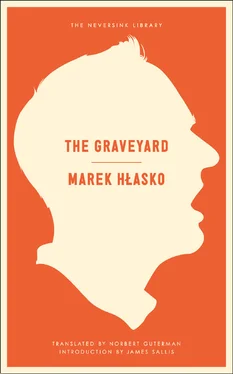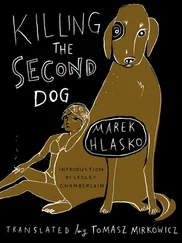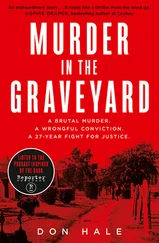Marek Hlasko
The Graveyard
MAREK HŁASKO(1934–1969) was born in Warsaw, the only child of parents who divorced when he was three. He was kicked out of high school and worked a series of menial jobs. While a truck driver, he began to write articles for a local newspaper, and soon after joined the crusading magazine Po Prostu as the editor of the literary section. In 1956, his short story collection A First Step in the Clouds won him immediate acclaim. It was followed by The Eighth Day of the Week , and two other novels, The Graveyard and Next Stop — Paradise . But when publishers refused to bring out his books, Hłasko traveled to Paris and published them in the émigré journal Kultura . It was a fateful decision: the Polish authorities gave him the choice of returning home and renouncing his work or staying abroad forever. He chose the latter, and spent the rest of his life in Western Europe, Israel, and the United States. He developed a reputation as a hard drinker and brawler, and was often in and out of prisons and psychiatric clinics. In 1966, Roman Polanski brought Hłasko to Hollywood to work as a screenwriter, but while there, he got into a fight with the composer Krzysztof Komeda, who died from his injuries a few days later. Six months afterward, Hłasko died from a fatal mixture of alcohol and sleeping pills. He was thirty-five years old and the author of ten novels, several collections of short stories and essays, and a memoir.
NORBERT GUTERMAN(1900–1984) also translated Hłasko’s The Eighth Day of the Week and Next Stop — Paradise .
JAMES SALLISis the author of Drive and the Lew Griffin series of crime novels, among many other books.
I was by no means the only reader of books on board the Neversink. Several other sailors were diligent readers, though their studies did not lie in the way of belles-lettres. Their favourite authors were such as you may find at the book-stalls around Fulton Market; they were slightly physiological in their nature. My book experiences on board of the frigate proved an example of a fact which every book-lover must have experienced before me, namely, that though public libraries have an imposing air, and doubtless contain invaluable volumes, yet, somehow, the books that prove most agreeable, grateful, and companionable, are those we pick up by chance here and there; those which seem put into our hands by Providence; those which pretend to little, but abound in much .
— HERMAN MELVILLE, WHITE JACKET
INTRODUCTION BONEYARD SINGERS BY JAMES SALLIS
Forty years ago, while living in London, I was exposed daily, as editor and reviewer, to streams of literature in translation: Boris Vian novels, story collections from Central and South American writers, short-shorts and plays by Sławomir Mrożek, Penguin’s Writing Today and Modern European Poets series. In the last I came across a volume dedicated to Zbigniew Herbert’s work and, following it back to Polish Writing Today , recognized elements in contemporary Polish literature — a jaggedness and dislocation, a seepage of the absurd and alien into dailyness — that was very much to my taste. I think of these discoveries as a specific hunger: the tacit recognition of something, some essential nutrient, the individual needs.
Soon I was reading Tadeusz Różewicz ( I am twenty-four / led to slaughter / I survived ); learning about Aleksander Wat, to whom much later I would dedicate one of my poems; scouting out the early work of Jerzy Kosiński; curving my young spine over Czesław Miłosz; and sinking with great sighs and eurekas into the ever-amazing, encyclopedic work of Stanisław Lem.
And as any wanderer about the roads of modern Polish writing would, soon I happened upon Marek Hłasko.
Were this fiction, he would be leaning desultorily against a tree, smoking a cigarette with a noncommittal air, as I happened by. He would decline the ride I’d offer, saying that, at least for the moment, he isn’t headed that way, but might I by any chance — his eyes at last meeting mine — spare a few złoty?
In 1965, situated for the moment back at Maisons-Laffitte, a town in the northwest suburbs of Paris where Jerzy Giedroyc, publisher of the émigré journal Kultura , had an office, Hłasko recalled his first stopover there upon his arrival in the West seven years before — before he spun, grasping for handholds, out into the world.
In February 1958, I disembarked at Orly Airport from an airplane that had taken off in Warsaw. I had eight dollars on me. I was twenty-four years old. I was the author of a published volume of short stories and two books that had been refused publication. I was also the recipient of the Publishers’ Prize, which I’d received a few weeks before my departure from Warsaw … Disembarking from the plane at Orly Airport, I thought I’d be back in Warsaw in no more than a year. Today, I know I’ll never return to Poland. *
Four years after writing those words, at age thirty-five and an exile for the past eleven years, Marek Hłasko was dead. He had overdosed on sleeping pills in Wiesbaden, Germany, on his way back to Israel from three years spent in the United States.
Paris, England, Spain, Germany, Switzerland, Austria, Denmark, the United States, Israel. One measures a circle beginning anywhere. So the spin, the circles of Hłasko’s life, blurred watermarks on the well-used wood of a bar.
Marek Hłasko sprang into the spotlight, arms outstretched, with the publication of the story collection A First Step into the Clouds in 1956, followed fast by a novel, The Eighth Day of the Week . He had already gained fame for his short stories, for his literary and film criticism and, as editor, for turning the student weekly Po prostu into a national newspaper. Soon deemed Poland’s most popular contemporary writer, in 1957 he was awarded the State Publishers’ Literary Prize for the collection, while his novel put on the new skin of fifteen or more languages as well as an incarnation in film.
Then, within two years, Hłasko the darling, having brought out two novels abroad once Polish censors refused to pass them for publication, became Hłasko the despised.
“I was known as a finished man,” he wrote in Beautiful Twentysomethings , the memoir quoted above, while ensconced again at the home of Kultura , which had brought out those two controversial novels, “and it was taken as a given, beyond any doubt, that I’d never write again. As I said, I was twenty-four years old. Those who’d buried me so quickly with the skill of career gravediggers were older than me by thirty years or more.”
The brilliant young writer — onetime petty thief, onetime truck driver across treacherous mountain roads, onetime manual laborer and noncompliant spy on fellow workers, onetime journalist and editor, always a heavy drinker, always a mustang among saddle horses — becomes officially renegade. Attacked by the Polish press, and with permission to extend his visa refused, Hłasko makes the decision to remain abroad.
And so he wandered, so he spun out and sideways and back again. To Paris. To Switzerland. Giving interviews to the foreign press, cut off permanently from the world of Polish journalism and publishing. To West Germany. Working as a truck driver and manual laborer in Israel, where he wrote, in a two-year period, four extraordinary novels. To Spain and Denmark. Marrying, in 1962, Sonja Ziemann, who had played the leading role in the film version of The Eighth Day of the Week . Hanging with Polanski in Hollywood. Writing in 1969 his American novel, The Rice Burners .
Читать дальше






![Ричард Деминг - Whistle Past the Graveyard [= Give the Girl a Gun]](/books/412176/richard-deming-whistle-past-the-graveyard-give-t-thumb.webp)


